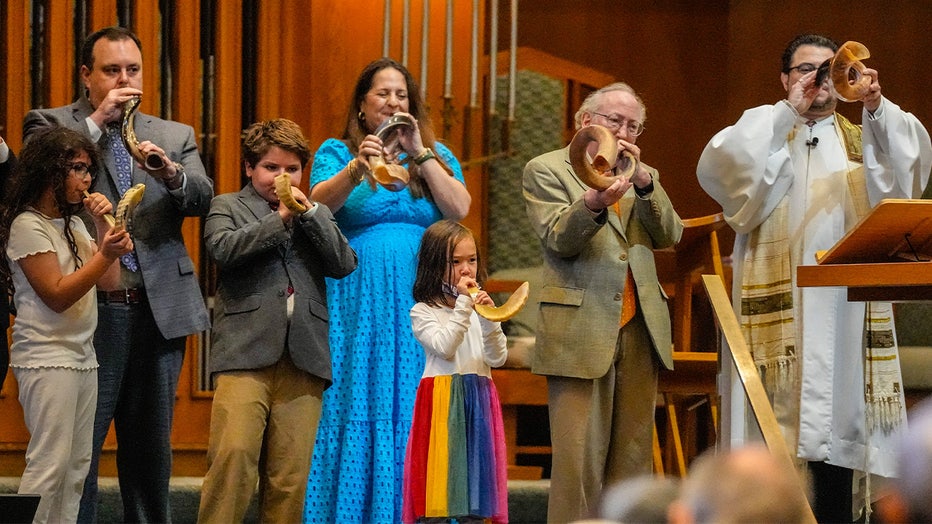Rosh Hashanah 2024: When does it start, what is it and how long does it last?

Entertaining food ideas for Rosh Hashanah
Beginning at sundown Friday, Jews around the world will begin celebrating Rosh Hashanah, marking the start of the Jewish New Year. Chef and lifestyle expert, Stephanie Nass, joined Good Day New York with some entertaining food ideas.
Beginning at sundown Wednesday, Jews worldwide will celebrate Rosh Hashanah, marking the start of the Jewish New Year.
When is Rosh Hashanah?
Rosh Hashanah will begin at sundown on Wednesday and end Friday at sundown.
It marks the start of the Jewish High Holidays, a 10-day season that ends with Yom Kippur, the Day of Atonement.
This day is among the holiest days in Judaism — and it begins on the first day of Tishrei, the seventh month of the Hebrew calendar, which almost always falls during the months of September or October each year.
It also marks the start of year 5785 in the Jewish calendar.
What is Rosh Hashanah?

The Shofar Squad blow on their shofars ending the Erev Rosh Hashanah service at Congregation Emanu El on Friday, Sept. 15, 2023 in Houston. (Karen Warren/Houston Chronicle via Getty Images)
Rosh Hashanah means "head of the year" or "first of the year," the festival is a time for reflection.
It is often celebrated with prayer, symbolic foods and the blowing of a traditional horn called a shofar (the ram's horn).
Rosh Hashanah "commemorates the creation of the world and marks the beginning of the Days of Awe, a 10-day period of introspection and repentance that culminates in the Yom Kippur holiday, also known as the Day of Atonement," according to History.com.
Rosh Hashanah and Yom Kippur are the two "High Holy Days" in the Jewish religion.
What are the symbolic foods of Rosh Hashanah?
The holiday's foods include honey-dipped apples, which represent sweetness and the hope for sweetness in the year ahead.
Also, round loaves of challah (braided egg bread) honor and respect the cycle of life.

Pomegranate, with its many seeds, is a joyful reminder of many blessings during the Jewish New Year. (Getty Images)
The pomegranate — with its plentiful seeds — is a joyful reminder of many blessings.
And the head of a fish, often displayed on a platter for all to see, represents the head of or the start of a new year, according to multiple sources.
The fish also represents fertility and abundance.
Emotions higher than ever this year
This year, for many, the emotions will be extraordinarily powerful, given that the midpoint of the 10 days spanning Rosh Hashanah and Yom Kippur is Oct. 7 — the one-year anniversary of the Hamas attack that killed 1,200 Israelis and triggered the still-ongoing war in Gaza.
For Jews in the U.S. — the world’s second-largest Jewish community after Israel — the past 12 months have been challenging in many ways linked to Oct. 7. There’s been a surge in antisemitic incidents, and many college campuses were wracked by divisive pro-Palestinian protests. Jews grieved for Israelis killed or taken hostage by Hamas; many also are grieving for the tens of thousands of Palestinians subsequently killed during Israel’s military offensive in Gaza.
In many Jewish communities across the U.S., special services are planned in conjunction with the Oct. 7 anniversary.
One distinctive example is in New York City, where Jews who oppose Zionism and support pro-Palestinian causes will convene for an evening service as Rosh Hashanah begins on Wednesday.
Leading the service will be Rabbi Andy Kahn, executive director of the American Council for Judaism – an 82-year-old organization focused on Judaism as a religion as opposed to a nationality.
"I’ve felt a big part of my calling is creating spaces for people who want a Jewish life, but don’t identify with Zionism," said Kahn. "I know a lot of people – Jews, non-Jews, Palestinians — who want Palestinian liberation and who are not antisemitic."
When is Yom Kippur?
This year, Yom Kippur will be observed from around sunset on Friday, Oct. 11, until after nightfall on Saturday, Oct. 12.
The Associated Press and FOX News contributed to this report.

